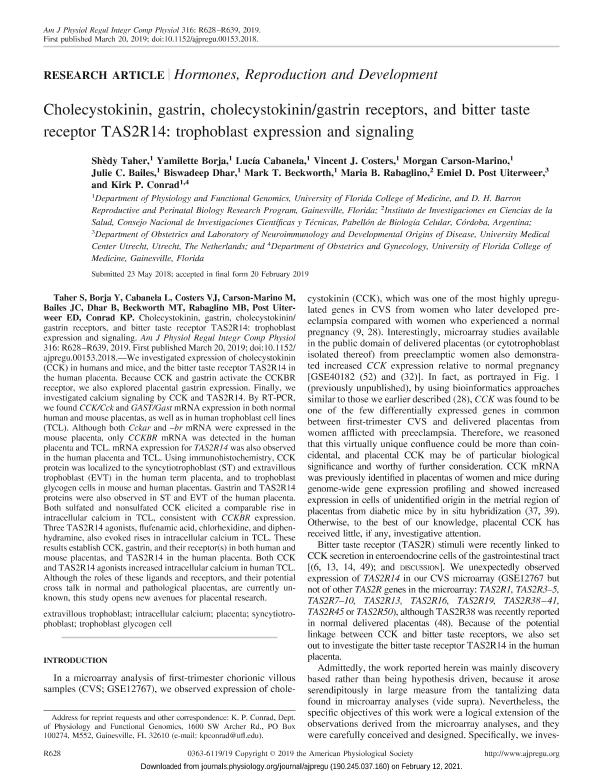Artículo
Cholecystokinin, gastrin, cholecystokinin/gastrin receptors, and bitter taste receptor TAS2R14: trophoblast expression and signaling
Taher, Shèdy; Borja, Yamilette; Cabanela, Lucía; Costers, Vincent J.; Carson Marino, Morgan; Bailes, Julie C.; Dhar, Biswadeep; Beckworth, Mark T.; Rabaglino, Maria Belen ; Post Uiterweer, Emiel D.; Conrad, Kirk P.
; Post Uiterweer, Emiel D.; Conrad, Kirk P.
 ; Post Uiterweer, Emiel D.; Conrad, Kirk P.
; Post Uiterweer, Emiel D.; Conrad, Kirk P.
Fecha de publicación:
01/05/2019
Editorial:
American Physiology Society
Revista:
American Journal of Physiology: Regulatory, Integrative and Comparative Physiology
e-ISSN:
1522-1490
Idioma:
Inglés
Tipo de recurso:
Artículo publicado
Clasificación temática:
Resumen
We investigated expression of cholecystokinin (CCK) in humans and mice, and the bitter taste receptor TAS2R14 in the human placenta. Because CCK and gastrin activate the CCKBR receptor, we also explored placental gastrin expression. Finally, we investigated calcium signaling by CCK and TAS2R14. By RT-PCR, we found CCK/Cck and GAST/Gast mRNA expression in both normal human and mouse placentas, as well as in human trophoblast cell lines (TCL). Although both Cckar and -br mRNA were expressed in the mouse placenta, only CCKBR mRNA was detected in the human placenta and TCL. mRNA expression for TAS2R14 was also observed in the human placenta and TCL. Using immunohistochemistry, CCK protein was localized to the syncytiotrophoblast (ST) and extravillous trophoblast (EVT) in the human term placenta, and to trophoblast glycogen cells in mouse and human placentas. Gastrin and TAS2R14 proteins were also observed in ST and EVT of the human placenta. Both sulfated and nonsulfated CCK elicited a comparable rise in intracellular calcium in TCL, consistent with CCKBR expression. Three TAS2R14 agonists, flufenamic acid, chlorhexidine, and diphenhydramine, also evoked rises in intracellular calcium in TCL. These results establish CCK, gastrin, and their receptor(s) in both human and mouse placentas, and TAS2R14 in the human placenta. Both CCK and TAS2R14 agonists increased intracellular calcium in human TCL. Although the roles of these ligands and receptors, and their potential cross talk in normal and pathological placentas, are currently unknown, this study opens new avenues for placental research.
Archivos asociados
Licencia
Identificadores
Colecciones
Articulos(INICSA)
Articulos de INSTITUTO DE INVESTIGACIONES EN CIENCIAS DE LA SALUD
Articulos de INSTITUTO DE INVESTIGACIONES EN CIENCIAS DE LA SALUD
Citación
Taher, Shèdy; Borja, Yamilette; Cabanela, Lucía; Costers, Vincent J.; Carson Marino, Morgan; et al.; Cholecystokinin, gastrin, cholecystokinin/gastrin receptors, and bitter taste receptor TAS2R14: trophoblast expression and signaling; American Physiology Society; American Journal of Physiology: Regulatory, Integrative and Comparative Physiology; 316; 5; 1-5-2019; 628-639
Compartir
Altmétricas



